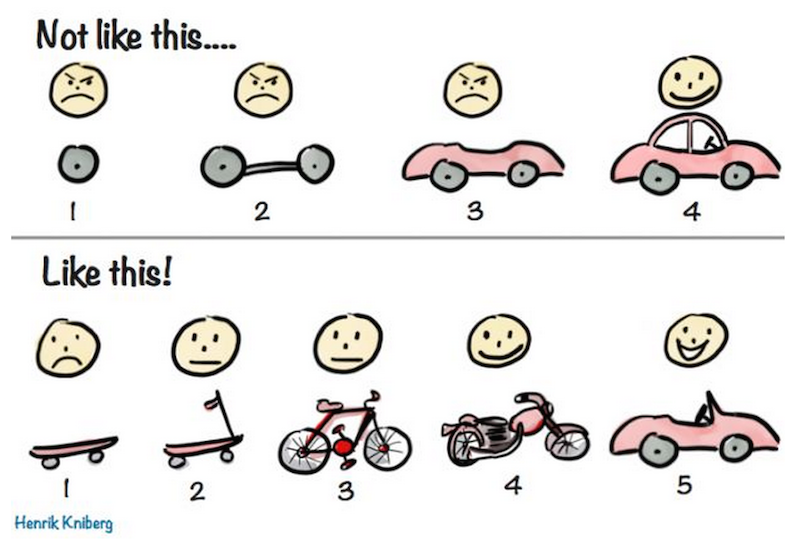I’ve been playing guitar on-and-off for the last few years, but this year decided to take things more seriously. I’ve been taking in-person lessons, but also have been watching a lot of YouTube content.
This has been a pretty good opportunity to reflect on how I learn effectively. The best approaches for learning for me are approaches where you can do something simple, completely, and then gradually learn how to do more complex things. This is as opposed to an approach where one learns a lot of “fundamentals”, and after that is able to produce a complete output (play a song, make a working piece of software, paint a painting).
I’ve been calling this the MVP (minimal viable product) approach because of an analogy to the concept of MVPs in product development. The idea behind MVPs (minimal viable products) is that one starts by releasing a small, simple product (the MVP), and then using feedback from customers to improve upon it, as opposed to taking longer to release a more fully-fledged product.
This video “5 Levels of ‘Hey Joe’ by Jimi Hendrix” by Ayla Tesler-Mabe I think does this approach well:
In this video, in the easy version, all you need are really basic open chords, the absolute first thing that a guitar player would learn, to play the entire song. So, very quickly, one can play the whole song (albeit, gratefully simplified). Subsequent levels introduce difficulty, and different techniques that get closer to what Hendrix was actually playing.
You could imagine an alternative approach, where you sequentially learn the different chords, scales, and techniques that are used on the actual record, and then at the end, put it together to play the actual song.
For me though, the approach that Ayla uses here is way more effective, and for a couple main reasons:
- It’s way easier to be engaged in a skill if you can actually do what you sought out to do earlier, rather than learning boring things scales and chords that don’t feel like the “real thing”
- If you stop halfway through, you’ll still have learned to do some complete things still, so it won’t have been a “waste” (I find that this makes the motivation required for starting way lower).
This reasoning is really similar to the value of using the MVP approach in product development, where the goal is to get to get to completion and value first, rather than perfection. This image from Henrik Kniberg really sums it up well:

A good example I’ve seen of this in the tech world is the fast.ai Deep Learning course. Where many traditional courses out there might start you out learning math fundamentals, in this course, rather than starting you off learning the principles of linear algebra, they start you on day 1 building a real application using Machine Learning libraries. Only after that do they start breaking out the details.
I’d be curious to hear about other courses that take approaches like this!